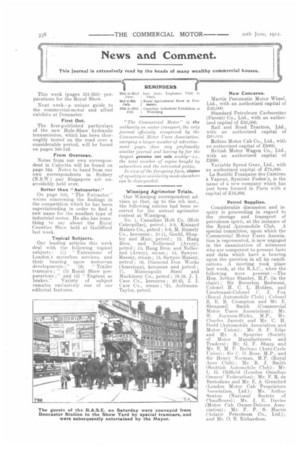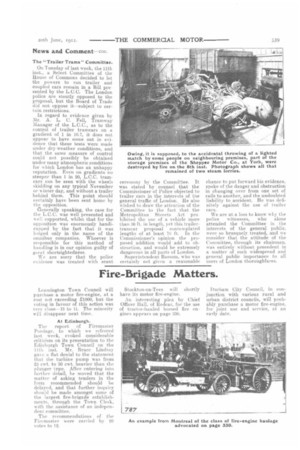journal is extensively read by the heads of many wealthy commercial houses,
Page 12

Page 13

If you've noticed an error in this article please click here to report it so we can fix it.
This week (pages 331-333)— preparations for the Royal Show.
Next week—a unique guide to the commercial-motor and allied exhibits at Doncaster, First Out.
The first-published particulars of the new Hele-Shaw hydraulic transmission, which has been thoroughly tested on the road over a considerable period, will be found on pages 340-342.
From Overseas.
Notes from our own correspondent in Calcutta will be found on page 344. Notes to hand from our own correspondents in Sydney (N.S.W.) and Singapore are unavoidably held over.
Better than "Autoporter."
On page 313, " The Extractor" writes concerning the findings in the competition which be has been superintending in order to find a new name for the smallest type of industrial motor. He also has something to say about the Royal Counties Show held at Guildford last week.
Topical Subjects.
Our leading articles this week deal with the following topical subjects : (1) " Extensions of London's motorbus services, and their bearing upon motorvan
developments ;" (2) " Trailer tramcars; " (3) Royal Show preparations ;" and (4) " Engines as brakes." Variety of subject remains exclusively one of our editorial features. " The Commercial Motor" is the authority on motor transport, the only journal officially recognized by the Commercial Motor Users Association, carrying a larger -number of advertisement pages than any professedly similar journal and having by far the largest genuine net Sale weekly—i.e.. the total number of copies bought by subscribers and the interested
In view of the foregoing farts, claims of equality or similarity made elsewhere can be disregarded.
Winnipeg Agrimotor Trials.
Our Winnipeg correspondent advises us that, up to the 4th inst., the following entries had been received for the annual agrimotor contest at Winnipeg.
No. 1, Canadian Holt Co. (Holt Caterpillar), petrol ; 2-5, Kinnard Haines Co., petrol ; 6-9, M. Rumely Co., kerosene ; 10-11, Goold, Shapley and Muir, petrol ; 12, Hang Bros. and Nellermol (Avery), petrol ; 13, Hang Bros. and NellermoI (Avery), steam ; 14, SawyerMassey, steam ; 15, Sawyer-Massey, petrol ; 16, Diamond Iron Works (American), kerosene and petrol ; 17, Minneapolis Steel and Machinery Co., petrol ; 18-19, J. I. Case Co., kerosene ; 20-23, J. I. Case Co., steam ; *24, AultmannTaylor, petrol.
New Concerns.
Martin Pneumatic Motor Wheel, Ltd., with an authorized capital of 240,000.
Standard Petroleum Carburetter (Parent) Co., Ltd., with an authorized capital of £50,000. Rail and Road Traction, Ltd., with an authorized capital of geo,nno.
Robins Motor Cab Co., Ltd., with an authorized capital of £5000. British Motor Wagon Co., Ltd., with an authorized capital of 22000.
Variable Speed Gear, Ltd., with an authorized capital of £75,000. La Societe Francaise des Camions Vapeur, Systeme Foden's, is the name of a new company which has just been formed in Paris with a capital of £16,000.
Petrol Supplies.
Considerable discussion and inquiry is proceeding in regard to the storage and transport of petroleum spirit, at the instance of the Royal Automobile Club. A special committee, upon which the Commercial Motor Users Association is represented, is now engaged in the examination of witnesses who are competent to present facts and data which have a bearing upon the question in all its ramifications. A meeting took place last week, at the R.A.C., when the following were present.:—The Hon. Arthur Stanley, M.P, (in the chair); Sir Boverton Redwood, Colonel H. C. L. Holden, and Lieutenant-Colonel C. J. Fox (Royal Automobile Club); Colonel R. E. B. Crompton and Mr. E. Shrapnel] Smith (Commercial Motor Users Association); Mr. W. Joynson-Hicks, M.P., Mr. Charles Jarrott and Mr. C. H. Dodd (Automobile Association and Motor Union); Mr. S. F. Edge and Mr. A. Spurrier (Society of Motor Manufacturers and Traders); Mr. G. F. Sharp and Mr. E. M. P. Boileau (Auto-Cycle Union); Sir C. D. Rose, M.P., and Sir Henry Norman, M.P. (Royal Aero Club) ; Mr. R. J. Smith (Scottish Automobile Club) ; Mr. L. G. Oldfield (London Omnibus Owners' Federation) : Mr. F. R. de Bertodano and Mr. E. A. Greathed (London Motor Cab Proprietors \ssociation, Ltd.) ; Mr. Arthur Sexton (National Society of Chauffeurs); Mr. J. E. Da vies (Motor Cab Owner-Drivers Association) ; Mr. F. P. S. Harris (Asiatic Petroleum Co., Ltd.) ; and Mr. 0. R. Richardson.
The "Trailer Trams" Committee.
On Tuesday of last week, the 11th inst., a Select Committee of the House of Commons decided to let the powers to run trailer and coupled cars remain in. a Bill presented by the L.C.C. The London police are stoutly opposed to the proposal, but the Board of Trade did not oppose it--subject to certain restrictions.
In regard to evidence given by Mr. A. L. C. Fell, Tramway Manager of the L.C.C., as to the control of trailer tramcars on a gradient of I. in 10.7, it does not appear to have come out in evidence that these tests were made under dry-weather conditions, and that the same measure of control could not possibly be obtained under many atmospheric conditions for which London has an unhappy reputation. Even on gradients no steeper than 1 in 20, L.C.C. tramcars can be seen with the wheels skidding on any typical November or winter day, and without a trailer behind them. This point should certainly have been sent home by the opposition.
Generally speaking, the case for the L.C.C. was well presented and well supported, whilst that for the opposition was enormously handicapped by the fact that it. was lodged only in the name of the omnibus companies. Whoever is responsible for this method of handling is in our opinion guilty of grea t shortsightedness.
We are sorry that the police evidence was treated with scant ceremony by the Committee. It was stated by counsel that the Commissioner of Police objected to trailer cars in the interests of the general traffic of London. He also wished to draw the attention of the Committee to the fact that the Metropolitan Streets Act pro hibited the use of a vehicle more than 36 ft. in length, yet this trailertramcar proposal con t empla ted lengths of at least 70 ft. In the Commissioner's opinion the proposed addition would add to obstruction, and would be extremely dangerous in all narts of London.
Superintendent Bassani, who was certainly not given a reasonable chance to put forward his evidence, spoke of the danger and obstruction in changing over from one set of rails to another and the undoubted liability to accident. He was definitely against the use of trailer cars.
We are at a loss to know why the police witnesses, who alone attended the Committee in the interests of the general public, were so brusquely treated, and we consider that, the attitude of the Committee, through its chairman, was entirely without precedent in a matter of such widespread and general public importance In all users of London thoroughfares.
























